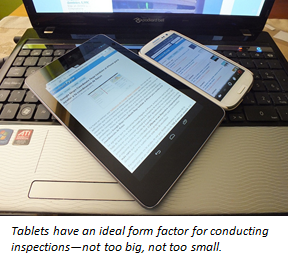The majority of businesses still use paper for the bulk of their inspection processes—particularly for routine inspecting such as daily vehicle inspections or equipment safety walkarounds.
But mobile inspections have so many advantages that I don’t think it will be long before we begin to see a major shift toward their use in inspections, audits, and assessments.
Apple’s introduction of the iPad tablet in 2010 set the stage for this shift. Although known primarily as consumer-oriented devices for play, tablets also happen to be an ideal device for many business purposes, including mobile inspections.
The reasons why tablets fit so well with mobile inspections are easy to understand:
1. Tablets can provide all the advantages mobile technology offers. With a product such as The Checker Mobile software, you can use tablets to do anything a laptop or smartphone can do, including:
- Share inspection results in real time.
- Reduce paper-related costs such as rekeying, copying, distributing, and storing paper inspection documentation.
- Track location of personnel and assets.
- Instantly archive inspection results for compliance, reporting, and analysis.
2. Tablets are more manageable than laptops. Tablets are much lighter than laptops, as well as less complicated to use. This makes them easier to work with in an on-the-go mobile setting, where even the smallest laptops can become unwieldy.
 3. Tablets have larger screens than smartphones. While smartphones can be used for mobile inspections, a tablet’s larger screen makes inputting easier, while still providing the convenience of touch-sensitivity.
3. Tablets have larger screens than smartphones. While smartphones can be used for mobile inspections, a tablet’s larger screen makes inputting easier, while still providing the convenience of touch-sensitivity.
4. Tablets tend to have longer battery lives than laptops or smartphones. Tablets have lower power requirements than laptops, and batteries make up a much larger portion of a tablet’s interior—therefore, tablets are typically able to last on battery power longer than laptops. Tablets’ advantage over smartphones is larger battery size, usually leading to longer life.
5. Tablets offer the right level of performance vs. cost. You can certainly find laptops with faster processing speeds (and a higher price tag) than tablets, but most tablets have all the performance capability necessary for mobile inspections. Most up-to-date smartphones also have the necessary capability, but they generally lag behind the performance of tablets, even though they often sell for comparable prices.
The Bottom Line
Laptops and smartphones can provide all the advantages of mobile inspections, but tablets seem to be the ideal form factor—not too big and not too small. That’s why, as businesses increasingly move to mobile, I think you’ll see tablets in the forefront of the change.
Image courtesy of miniyo73, Creative Commons.










